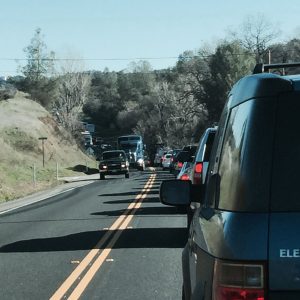Sonora, CA — AAA predicts 119.3 million people will travel 50 miles or more from home during the holiday season, from Saturday, December 21, to Wednesday, January 1, narrowly surpassing the previous record set in 2019.
Most travelers, 90 percent or 107 million people, are expected to load up their cars and head onto the roadways. This year’s domestic travel projection is 2.5 million higher than last year; it is still shy of 2019’s record of 108 million. Fueling that trend is lower gas prices than last year. As we recently reported, pump prices in Northern California, including the Mother Lode, dropped faster than the rest of the state and the country, and it has been on the decline for six straight weeks. Find local gas prices by clicking here and anytime on the mymotherlode.com homepage and clicking on traffic, then hit the local gas prices box above the traffic map.
Air travel is expected to set a new record with 7.85 million passengers, surpassing the previous record of 7.5 million last year. However, booking data shows flights are 4% more expensive this holiday season, with the average domestic ticket being $830 and international flights at $1,630 a ticket.
AAA provided these road trip safety tips:
- Follow Posted Speed Limits: While it’s tempting to speed to save time, the facts don’t support it. Even minor increases in speed can make crashes deadly.
- Driving 80 mph instead of 75 mph over 100 miles saves only 5 minutes, hardly worth the risk.
- Speeding may feel faster but often leads to tragedy.
- Drive Only When Alert and Refreshed: Driving on 4-5 hours of sleep is as dangerous as driving with a 0.08 BAC (legal intoxication). Less than 4 hours of sleep? The risk doubles.
- Travel during hours you’re normally awake and avoid overnight drives.
- Steer clear of heavy meals, drowsy medications, and alcohol.
- For long trips, take breaks every 2 hours or 100 miles. Use these breaks to switch drivers if possible, or park at a safe location and nap for 20-30 minutes to recharge.
Slow Down, Move Over: A roadside worker is killed every other week in the U.S. To help prevent these tragedies, AAA asks drives to Slow Down, Move Over.
- When you see an emergency responder on the side of the road assisting a stranded driver, reduce your speed.
- If possible, change lanes to give those crews room to do their jobs safely.
- All 50 states and the District of Columbia have Move Over laws in place.

